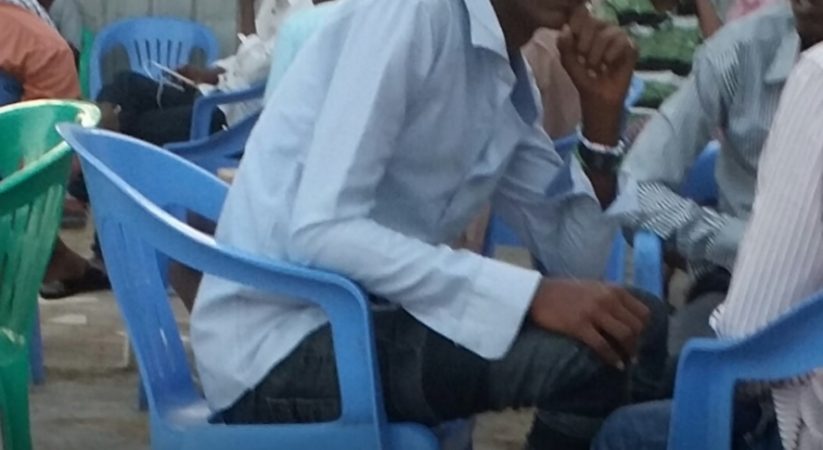
MOGADISHU, April 13 — Waving a placard with the words “Walaal Shaqo Isii,” translating into “my brother give me a job,” Iglan Abdullahi Mohamed, aged 22, recently burst into the streets of Mogadishu, the capital of Somalia, opening the lid on growing frustration among unemployed youth in the country.
Dressed in a cream-white flowing Islamic gown called buibui, Abdullahi staged a protest in the bustling Mogadishu streets as she waved the placard to the consternation of onlookers. She narrated to motorists and pedestrians her predicament, taking care of her younger siblings without a decent job.
Abdullahi lost her mother, the family’s sole breadwinner and her elder brother to a terrorist attack at the Mogadishu Mall in February 2019. The deadly blast also claimed the lives of 16 other shoppers while 38 suffered injuries.
“The untimely demise of my mother and brother left me with the responsibility to provide for my four siblings and pay for my university fees, a role previously played by my mother,” she told Xinhua during a recent interview in Mogadishu. “I found it difficult to put food on the table for my siblings. Out of desperation, I found myself out on the streets begging for a job.”
Abdullahi graduated from the University of Somalia in Mogadishu in 2021 with a degree in public administration but since then, she has been looking for job opportunities to no avail. “I persevered to remain at home without a job for years, but the responsibility to fend for my younger siblings forced me to beg for a job in the most unusual way,” she said.
Her action in a conservative community, which forbids women from expressing desperation in public has caused tongues to wag on social media with pundits saying her strange action mirrors the soaring frustrations affecting Somalia’s unemployed youth.
High level of unemployment has been blamed for youth recruitment into outlawed militia groups that use them to carry out attacks inside the country and across the borders.
Ali Hussein, aged 25, started a small business to eke out a living after staying two years without a job, having graduated from the Modern University of Science and Technology in Mogadishu in 2019 with a degree in business administration.
Dusting shelves stocked with bundles of new clothing as customers made purchases ahead of the Eid Fitr festivity marking the end of the holy month of Ramadan, he said that he opted to borrow money from relatives and try his hands at the clothes business.
“I am doing this retail business to keep myself away from idleness that could lead me into engaging in bad activities. This business also supports my family, but my dream is one day to get a white-collar job,” Hussein said.
Hussein, who hails from Baidoa in the South-West State of Somalia, migrated to Adado six months ago to start his small-scale business since he felt embarrassed to start a similar venture in Baidoa whose residents expected his degree certificate would secure him a well-paying job.
According to the Somalia Integrated Household Budget Survey (SIHBS) 2022, the first of its kind since 1985, the youth unemployment rate currently stands at 30.1 percent.
“Nearly two-thirds (65.5 percent) of the Somali population has no formal education. The educational level most commonly reported is primary education, as this group represents 16.6 percent of the population. Only 4.6 percent of the population report having completed secondary education and 4 percent attained higher education,” said the report.
The report said that among nomads, the overwhelming majority, or 92.5 percent, reported no formal education, while two-thirds or 68.6 percent of rural respondents have no formal education. Only 3 percent of rural residents have completed secondary education and 1.7 percent have attained higher education.
Sabrin Hassan Mohamed, a public health major from the Horn Africa University Adado campus, central Somalia, said getting a job in Somalia remains a mirage for the majority of the youth, with the potential to create a national crisis. After looking for gainful employment for three years to no avail, she decided to borrow capital from family members and start her small eatery business on one of the streets of Adado.
She started her now-popular eatery called Maamus, the graduates’ joint, in one room with 50 U.S. dollars borrowed from a family member, adding that she got support from fellow unemployed graduates who frequent the joint as they vent frustrations regarding unemployment.
“The eatery is now a popular meeting place for job seekers. The unemployed youth arrive in the morning and stay until midnight when we close for the day,” she said. “Most of the discussions here are mainly about unemployment and lack of opportunities for the youth in Somalia hence this joint has been nicknamed by the locals the graduates’ joint.”
_________________________________________________________________________
Sources: Xinhua
_________________________________________________________________________
Qaranimo Online
_____________________________________________________________________________________Xafiiska Wararka Qaranimo Online | Mogadishu, Somalia
_____________________________________________________________________________________Advertisement
_____________________________________________________________________________________





